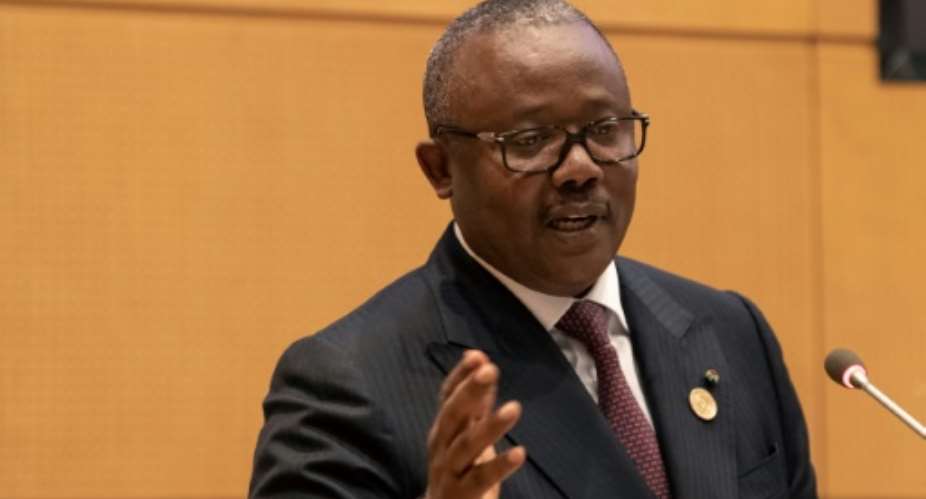Guinea-Bissau heads to the polls on Sunday in legislative elections called by the president, who seeks constitutional change in a bid to end the country's history of political instability.
Having freshly repealed a coup attempt in February, 2022, President Umaro Sissoco Embalo dissolved the national assembly in May after falling out with lawmakers.
Embalo said he had "persistent differences that could not be resolved" with parliament, which he said had become rife with "guerrilla politics and conspiracy".
He accused lawmakers of having protected MPs implicated in corruption cases and refusing to be audited.
Embalo has long sought to change the constitution, which the international community cites as an important factor behind the country's instability.
While the changes he intends to make are not clear, critics accuse him of seeking to consolidate power following the disputed 2019 presidential election.
Twenty-two political parties will compete in Sunday's vote to elect 102 MPs, with around 884,000 people registered to vote.
Results are expected within forty-eight hours.
Currently, three dominant parties share almost all the seats in the current national assembly.
They are the president's Madem G15 party, the long-dominant African Party for the Independence of Guinea and Cape Verde (PAIGC), and the Party for Social Renewal (PRS).
Notoriously unstable
Guinea-Bissau, a former Portuguese colony of around two million people, is notoriously unstable, having suffered four military coups since 1974, most recently in 2012.
Aftershocks from the war in Ukraine, which has driven-up global food prices, as well as the Covid-19 pandemic, have had a detrimental impact on the country's economy.
One-fifth of the population experiences food insecurity, according to the UN.
Farmers have been unhappy with the government's raising of the base price of the cashew nut, a key export and source of revenue for the population.
Discontent with the government's policy was evident on the campaign trail.
"We travelled all over the country, but farmers refuse to come and listen to the speeches of some candidates because of the failure of the cashew nut... campaign," Buli Camara, a Madem activist, told AFP.
"This year, it's a total fiasco".
Elsewhere there is little enthusiasm for the election.
Antonio Nhaga, head of a media monitoring group, said leaders "don't propose anything that would lead anyone to believe (there will be) actual change in peoples' lives."
But reform is much needed.
Instability and poverty have made the country appealing to narco-traffickers who smuggle cocaine from Latin America to Europe. Timber trafficking and corruption are also rampant.
The Economic Community of West African States (ECOWAS) has deployed a team of 15 election observers, while 600 soldiers have been deployed to prevent a new coup.





 Tuesday’s downpour destroys ceiling of Circuit Court '8' in Accra
Tuesday’s downpour destroys ceiling of Circuit Court '8' in Accra
 SOEs shouldn't compromise on ethical standards, accountability – Akufo-Addo
SOEs shouldn't compromise on ethical standards, accountability – Akufo-Addo
 Father of 2-year-old boy attacked by dog appeals for financial support
Father of 2-year-old boy attacked by dog appeals for financial support
 Jubilee House National Security Operative allegedly swindles businessman over sa...
Jubilee House National Security Operative allegedly swindles businessman over sa...
 Nobody can order dumsor timetable except Energy Minister – Osafo-Maafo
Nobody can order dumsor timetable except Energy Minister – Osafo-Maafo
 Mahama wishes National Chief Imam as he clock 105 years today
Mahama wishes National Chief Imam as he clock 105 years today
 J.B.Danquah Adu’s murder trial: Case adjourned to April 29
J.B.Danquah Adu’s murder trial: Case adjourned to April 29
 High Court issues arrest warrant for former MASLOC Boss
High Court issues arrest warrant for former MASLOC Boss
 Align academic curriculum with industry needs — Stanbic Bank Ghana CEO advocates
Align academic curriculum with industry needs — Stanbic Bank Ghana CEO advocates
 Election 2024: We'll declare the results and let Ghanaians know we've won - Manh...
Election 2024: We'll declare the results and let Ghanaians know we've won - Manh...
